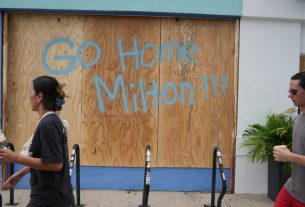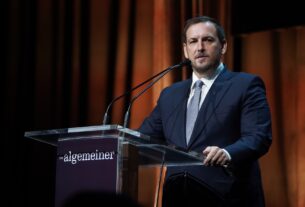Spencer Ackerman has covered the War on Terror from almost the very beginning for publications like The New Republic, Wired, The Guardian, and The Daily Beast, and continues to do so in his excellent newsletter Forever Wars. He was part of the Pulitzer-winning team that revealed Edward Snowden’s disclosures of NSA surveillance, and won a National Magazine Award for his reporting on Islamophobia in the FBI’s counterterrorism training program. All that work has culminated in his first book, published last month—Reign of Terror: How the 9/11 Era Destabilized America and Produced Trump—one of the first truly comprehensive accounts of how the September 11th attacks permanently transformed American culture and politics. Animated by Spencer’s trademark combative prose and punk rock spirit, the book persuasively connects two decades of militarism and imperialism abroad with xenophobia and illiberalism at home.
Spencer is also my neighbor, and for this week’s newsletter (to which you can subscribe here), we got together for drinks and discussed his self-described “redpilling” after 9/11, his ideological awakening while working under the infamously pro-war editorial regime of Marty Peretz and Leon Wieseltier at The New Republic, his strained relationship with Zionism, and his response to criticism of his book. Our conversation has been condensed and edited.
David Klion: How has your background growing up in Brooklyn shaped your worldview?
Spencer Ackerman: I grew up in a middle-class Jewish neighborhood in Flatbush. My mother considered herself a Trotskyist, although some Trotskyists would probably have considered her a liberal. I was a kid during the endgame of the Cold War, and my mother was going to socialist reading groups and having a falling-out with a Stalinist friend. When I was 10 years old she put me on a bus to DC that smelled like piss to go protest the first Gulf War; I loved it because I could curse and my mother was cool with that. I came up in New York punk rock and hardcore circles, which were not patriotic or supportive of capitalism or American foreign policy.
But my mother was also basically a liberal Zionist, even though she would have recoiled at that phrase. She believed deeply that the Jewish experience of diaspora is an experience of horror. Ideally, she wanted to see the hegemony of the international multiracial working class, which would provide space for the Jewish people to thrive. But given that we didn’t have that, she supported a Jewish state; she acknowledged that it committed atrocities, but so did other states.
She did admit that Israel had a lot of crazies, who she saw as unfortunate deviations from true Zionism. We lived a mile or so north of Avenue J in Midwood, which was a center of modern Orthodox settler Zionism. I remember going to the bakery or the deli there and seeing tzedakah boxes on the counters with pictures of snarling German shepherds that would say “help protect our boys in Judea and Samaria.” In hindsight, they were running guns and selling drugs to finance West Bank settlements. After 9/11, there were posters all throughout Midwood of Meir Kahane or the disgusting Jewish Defense League Magen David fist logo. My mother hated the JDL. She had grown up in a neighborhood in Queens that was transitioning from Jewish to Black, and the JDL were always offering to escort Jewish girls home from school; they harassed her best friend’s prom date because he was Black. We saw the JDL as emblems of Jewish fascism. But still, I was never taught to see them as terrorists. Even though we knew about incidents like the attempted bombing of the Temple Mount in 1984, we never understood “terrorism” as a Jewish phenomenon.
DK: That reminds me of the first chapter of your book, where you write about Oklahoma City bomber Timothy McVeigh and how white America writ large fails to recognize right-wing political violence as terrorism or to respond the way it has to violence committed by Muslims. You’re saying you had a similar blind spot within the Jewish world of Brooklyn.
SA: Yeah. History is full of examples of Jews, and in particular Zionists, unapologetically committing acts of violence against innocent people to achieve political ends. Terrorism was a feature throughout the mandatory period in Palestine. The establishment of the State of Israel is the story of an expanding series of pogroms, something so familiar from Jewish history as to be unmistakable, once you’re prepared to look at it.
I went to Israel for the first and only time in December 2001, as part of the AJC’s tour for college journalists. I was one of two Jews out of maybe 16 kids on this trip. It’s underappreciated how many gentiles are pro-Israel because they genuinely don’t want anything to do with antisemitism, and how every single American Jewish institution exploits that. I was still a Zionist, and just absolutely in love with the country. My mother made sure that I brought a stone back so we could put it on her father’s grave. This was in the middle of the Second Intifada, so bombs kept going off in Jerusalem and Tel Aviv. The message we got was that Israel and America were fighting the same war. There was a t-shirt at tourist sites with a picture of an F-16 that said, “Don’t worry, America, Israel is with you.” It’s like, who sold Israel that fighter jet?
DK: How did you personally experience 9/11 and its aftermath?
SA: I was 21 and studying at Rutgers, and I was supposed to cover a campaign appearance by New Jersey gubernatorial hopeful Jim McGreevey for the school newspaper that morning. I woke up to find my roommates watching the planes hit the towers on TV. My primary memory of that day was the agony of not being able to get home, and just thinking that everyone I cared about could die and there was nothing I could do to stop it. So I just threw myself into covering it for the paper.
Later, we went to a friend’s house and just got enormously baked with some of her friends who were baggage handlers at Newark Airport, who kept talking about how easy it would be to sneak explosives into any luggage and blow some shit up. That experience turned me into a savage. I was just mainlining fear and anxiety and hatred for months. I wasn’t interested in civilizational explanations—I was just extremely mad at the people who forced me to watch thousands of my neighbors dying. It didn’t matter to me at that point that this kind of fear was being exploited for violent and hegemonic purposes. I wanted revenge. In the book I write that the War on Terror was an early redpill, and I swallowed that pill myself.
It’s hard to express now, but there was an exceptionally narrow band of acceptable opinion in the aftermath, as was clear from what we would now recognize as the cancellation of Susan Sontag for writing that 9/11 was a response to America violently dominating the Muslim world. The alternative on offer was patriotic license to inflict overwhelming and omnidirectional suffering.
DK: How did you end up at The New Republic, and what was your experience there under its then-hawkish leadership? How did your views on the War on Terror evolve?
SA: I view my life post-TNR as a villain’s attempt at redemption, but it’s not a straightforward story with a sharp breaking point. I got an internship at TNR very unexpectedly after graduating college in 2002. I felt very lucky to have something that prestigious; my mother was proud of me, even though it was not her politics. In the wake of the attacks, it was possible for me to convince myself that the US military was engaged in an epic struggle to free people. All of the people around me at the magazine saw the War on Terror as valorous.
I was surrounded by professional journalists who were 10 years older than me and had a more sophisticated grasp of national politics and economics. None of them wanted to write for the website, which was just becoming a thing. As I saw it, I could try and fail to get into the print magazine every week, or take advantage of this enormous opportunity to cover the news online. I had been reading nonstop about the War on Terror, and while the editors cared a lot about that, they only covered it with op-eds and thinkpieces. They didn’t have anyone actually reporting on the mechanisms of the wars. So I decided to teach myself to do that.
The more I poked into the details of the wars, the more fucked up they looked. Peter Beinart [ed. note: now Jewish Currents’ editor-at-large] was the editor of TNR at the time, and the Iraq War was looking pretty bad to him as well. He thought it was important for a magazine that had done so much to advance the cause of war to have a consistent chronicle of what it was in practice, and that became my job, in the form of a blog called “Iraq’d” that I started in January 2004. By that point Iraq was totally on fire; I thought I would be writing about the uneven struggle of the Iraqi people to organize a viable democracy, and instead I was blogging about torture jails and sectarian civil war. I realized pretty quickly that I no longer held the ideological position the blog was launched from, and I felt compelled to say that. It was just obvious—though unfortunately it hadn’t been to me earlier—that Iraq was not only a mistake but a moral emergency requiring immediate redress.
Still, I wrote in a cautious and fearful way. I wanted to believe in TNR’s self-conception as a publication defined by intellectual curiosity and celebration of inquiry. But I came to understand that it was a censorious and racist place, devoted to justifying everything evil in both America and Israel, which was a really shattering experience. In hindsight I should have quit, but I didn’t know if I would ever have another job in journalism.
As the 2004 election approached, the magazine grew more inclined to publish me because I could write 1500 words on Iraq that would hold up two weeks later. The editors decided to have a big all-hands meeting to debate if the magazine was wrong to push for the war. I had just turned 24, and I was asked to argue the position that everyone who ran the magazine was wrong. I was up against Lawrence F. Kaplan, the magazine’s chief foreign policy writer, who wrote a book with Bill Kristol advocating for the war—and to Lawrence’s credit, unlike every other neocon, he eventually had the decency to retire from public life. We were in that conference room literally for hours, with all my colleagues watching as I assaulted the ethics of the people I worked for. I was fulsomely detailing the brutality practiced by the US in Iraq that I had been documenting, when suddenly Marty Peretz asked me whether Bill Calley was personally responsible for the My Lai massacre. I said obviously Calley did it, but the whole American war effort in Vietnam was implicated, and he just erupted at me and explained why I’m a shitty human being incapable of basic moral reasoning. Shout-out to Peter, who didn’t fire me, because from what I understand, Marty pressured him and all of his successors to do so, and eventually found the one who would do it.
DK: Reign of Terror—which is the product of years of confrontational reporting in your long post-TNR career—has generally been very well received, and I loved it, but I’ve encountered two related valid criticisms. One is that your central thesis that 9/11 led to Trump’s presidency is too simplistic, since Trump’s presidency was hardly monocausal. The other is that 9/11 wasn’t such a sharp breaking point, and that the history of US imperialism and xenophobia runs much deeper. How would you respond?
SA: I’m very grateful for the opportunity. In the book I try to explain that the forces defining the post-9/11 era were nothing new in American history—that 9/11 was a circumstance that gave the most violent, nativist, and racist aspects of American history a new rationale in an era of righteous, patriotic urgency. The War on Terror was an inflection point, and it had yet to be properly contextualized that way. We’ve had so many explanations on offer for Trump, many of which are very good and persuasive. My close friend Adam Serwer, for instance, has demonstrated how rooted Trump is in white supremacy and nativism that have been present throughout US history. But I wanted to demonstrate that the War on Terror is crucial context for all of the other explanations.
Birtherism, for instance—which was how Trump really launched his political ascension—was not just anti-Black racism; it was also part of the culture of the War on Terror. It said Barack Obama was America’s enemy not just because he was supposedly secretly Kenyan, but specifically because he was supposedly a Kenyan Muslim, and that people like him were responsible for the attacks. The atmosphere of emergency post-9/11 allowed these things to fuse together and grow in intensity. I wrote Reign of Terror because I had grown frustrated with how all of the other explanations for Trump left out how by 2016 we had experienced 15 years of an agonizing, inconclusive war against a non-white enemy, from a religion that most Americans are unfamiliar with and regard as something to be feared. That was present in Trump’s own words, and he surrounded himself with some of the most vicious and exploitative proponents of that culture—including Mike Flynn, John Kelly, Erik Prince, Jeff Sessions, and Rudy Giuliani, among others.
Now we have all this gauzy bullshit rhetoric about how America was united, which it never truly was. America was mobilized against an enemy, both internally and abroad. That’s not unity or solidarity, it’s predation. We need to always remember that. Unfortunately, as we can see from how so much of the media and the Washington establishment responded to Biden’s withdrawal from Afghanistan, no lessons have been learned.
David Klion is the newsletter editor for Jewish Currents.
The post Mainlining Fear and Hatred appeared first on Jewish Currents.



